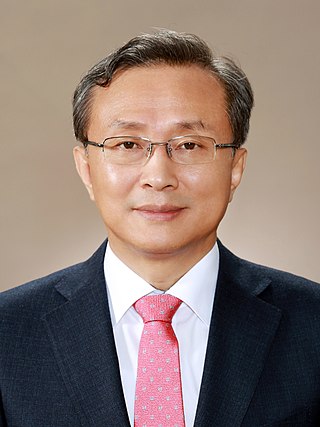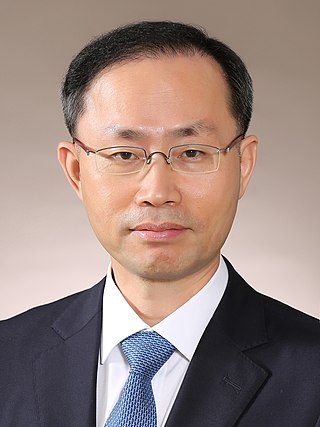
The Constitutional Court of Korea (Korean: 헌법재판소) is one of the highest courts – along with the Supreme Court – in South Korea's judiciary that exercises constitutional review, seated in Jongno, Seoul. The South Korean constitution vests judicial power in courts composed of judges, which establishes the ordinary-court system, but also separates an independent constitutional court and grants it exclusive jurisdiction over matters of constitutionality. Specifically, Chapter VI Article 111 Clause 1 of the South Korean Constitution specifies the following cases to be exclusively reviewed by the Constitutional Court:
- Constitutionality of a law upon the request of the courts;
- Impeachment;
- Dissolution of a political party;
- Competence disputes between State agencies, between State agencies and local governments, and between local governments; and
- Constitutional complaints as prescribed by [the Constitutional Court] Act.

The Supreme Court of Korea is the highest ordinary court in the judicial branch of South Korea, seated in Seocho, Seoul. Established under Chapter 5 of the Constitution of South Korea, the court has ultimate and comprehensive jurisdiction over all cases except those cases falling under the jurisdiction of the Constitutional Court of Korea. It consists of 14 justices, including the chief justice of the Supreme Court of Korea. The Supreme Court is at the top of the hierarchy of all ordinary courts in South Korea, and traditionally represented the conventional judiciary of South Korea. The Supreme Court has equivalent status as one of the two highest courts in South Korea. The other is the Constitutional Court of Korea.

O-Gon Kwon is a South Korean jurist, best known for being one of the three judges in the trial of Slobodan Milošević. He also sat on the bench for the trial of former Bosnian Serb leader Radovan Karadžić.

Kim Yi-su is a former Justice of the Constitutional Court of Korea.

Lee Jin-sung was the 6th President of the Constitutional Court of South Korea, appointed by Moon Jae-in on November 24, 2017.

Kang Il-Won is a former Justice of the Constitutional Court of Korea. He graduated with degrees in law from Seoul National University (LL.B.) and the University of Michigan Law School (LL.M.). He was also a member of Venice Commission representing South Korea, from 2015.

Seo Ki-Seog is a South Korean judge. He was appointed to the Justice of the Constitutional Court of Korea in 2013

Yoo Nam-seok was the 7th President of the Constitutional Court of Korea since 21 September 2018 to 10 November 2023. Following the vacancy of the presidency of the Constitutional Court; his position has been held since 11 November 2023 by the acting president Lee Eu-nae until the nomination of the new president in the Constitutional Court. During his tenure, he was widely perceived to be part of the court's liberal bloc, and the Constitutional Court struck down restrictions of abortion in South Korea in 2019.

Lee Seon-ae is a South Korean women jurist, who serves as Justice of the Constitutional Court of Korea since 2017. She was nominated by Supreme Court chief Yang Sung-tae and appointed by acting President Hwang Kyo-ahn. She is regarded as moderate group among nine Justices of the Constitutional Court.

Cho Yong-ho is a South Korean judge, serving as a Justice of the Constitutional Court of Korea from April 2013 to April 2019.

Lee Youngjin is a South Korean judge. He was appointed to Justice of the Constitutional Court of Korea in 2018.

Kim Kiyoung is a South Korean judge. He was appointed to Justice of the Constitutional Court of Korea in 2018.

Moon Hyung-bae is a South Korean judge. He was named a Justice of the Constitutional Court of Korea in 2019.

Park Jongmun was named the Secretary General of the Constitutional Court of Korea in 2019.

The judiciary of South Korea is the judicial branch (사법부) of the South Korean central government, established by Chapter 5 and 6 of the Constitution of South Korea.

Justice Kim Hyungdu has served on the Constitutional Court of Korea since March 31, 2023, succeeding Justice Lee Seon-ae. He is noted for his long judicial career and significant contributions to Korean jurisprudence.

Jeong Jeong-mi, also romanized as Jung Jungmi, is a South Korean jurist who serves as a justice of the Constitutional Court of South Korea. She was nominated by Chief Justice Kim Myeong-su on March 6, 2023, and officially appointed to the court by President Yoon Suk Yeol on April 17, 2023. She is the sixth woman to serve on the Constitutional Court.

Jeong Hyeong-sik, also romanized as Cheong Hyungsik, is a South Korean jurist who serves as a justice of the Constitutional Court of South Korea. He was nominated by President Yoon Suk Yeol on November 16, 2023, and officially appointed to the court on December 18, 2023.

Kim Bok-hyeong, also romanized as Kim Bok-hyung, is a South Korean jurist who serves as a justice of the Constitutional Court of South Korea. She was nominated by Chief Justice Cho Hee-dae on August 20, 2024, and officially appointed to the court by President Yoon Suk Yeol on September 12, 2024, with her term officially beginning on September 21. She is the seventh woman to serve on the Constitutional Court after Justice Jeong Jeong-mi.

Cho Hanchang is a South Korean jurist who serves as a justice of the Constitutional Court of South Korea. He was nominated by the National Assembly on December 26, 2024, upon the recommendation of the People Power Party and officially appointed to the court by acting president Choi Sang-mok on January 1, 2025.




















